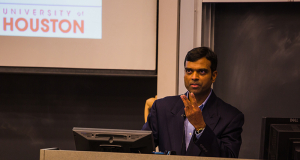Serving as the home to the world’s largest medical center, a thriving energy industry and an array of multicultural communities, the city of Houston is a vibrant center for diversity. The University of Houston, located in the heart of the energy capital of the world, reflects this diversity on its campus. The Cullen College of Engineering attracts top students from all walks of life, and it’s common for classrooms to include local and international students, as well as professionals returning to school and first-generation college students.
Phaneendra Kondapi, adjunct professor of subsea engineering, carefully developed the curriculum of his course to harness the potential of the diverse student body at the Cullen College of Engineering. Kondapi teaches “Flow Assurance,” a graduate level course for subsea engineers boasting one of the largest student enrollments on campus.
Using an innovative teaching method called reverse circular teaching, Kondapi developed this course to provide a cutting-edge, industry-relevant education to students. He said his primary goal is to prepare students for real-world challenges by familiarizing them with the tools, resources and soft skills needed to succeed in the subsea engineering industry.
Each semester, students in Kondapi’s class must complete a group field architecture design project that requires student groups to use actual data and industry-standard software, such as Pipesim, to address current challenges in the subsea industry. At the conclusion of the project, each team delivers a client-oriented presentation before a panel of industry experts, including hiring managers from local engineering firms. He also encourages students to present their projects at conferences and meetings to gain additional familiarity with professional presentations.
By introducing the project overview and goals at the beginning of the semester, Kondapi said his students can more easily connect the dots between his classroom lessons and the real-world applications of these lessons.
“This reverse circular method of teaching enables students to make stronger connections between theories and potential applications as they learn,” Kondapi said. “I introduce them [to the project] initially so they can think about it while I teach theory that is relevant to the project.”
Graduate student Santosh Adada took “Flow Assurance” during his first semester at the Cullen College. He said being introduced to a holistic view of subsea engineering early in in the program gave him a unique advantage to understanding the material.
“From the introduction of theory to the design project, the class provided me with a big picture understanding of the subsea industry,” said Adada.
A major component of industry success is being able to work as part of a diverse team. In an effort to develop a global work culture in the classroom, Kondapi said he takes the diverse backgrounds of his students into consideration when assigning teams for the group project. He said he hopes to uniquely simulate the types of project teams engineers may encounter during their careers, improving communication and encouraging idea sharing and networking amongst students from vastly different cultural backgrounds and varying levels of professional experience.
Kondapi considers seven distinct factors when making group assignments, including years of professional oil and gas experience, educational background and country of origin.
“I use [these factors] to assign project groups to create a true industry working culture that reflects the subsea business,” he said. “As far as I know, this is an extremely unique feature for a university-level course and I’m proud to introduce it for the first time to the global academic community.”
Students in Kondapi’s “Flow Assurance” course agreed with his sentiments, expressing that their takeaways from the class went far beyond basic engineering concepts and chalkboard lessons.
“The semester project was very in-depth and relevant to current industry demands,” said Robert Hernandez, a senior subsea process engineer at KBR and former colleague of Kondapi.
Hernandez took Kondapi’s course in the spring of 2015. Despite having extensive professional experience in the subsea industry, Hernandez said he tried to allow other team members to lead the team project, providing guidance when needed. What he enjoyed most, he said, was being able to share his knowledge with others who were in the early stages of their careers.
“It was a lot of fun teaching my classmates about the [engineering principles,]” said Hernandez.
Graduate subsea engineering student Andrea Villamizar moved from Venezuela to Texas to pursue her education at the Cullen College. She took the “Flow Assurance” class last spring and served as a teaching assistant for the course in the fall of 2015.
“Working with a multicultural team gives you a lot of tools to develop [the project],” she said.
Villamizar said she believes the Cullen College has provided her invaluable experience, preparing her for a future career in Houston.
“Because Houston is such a multicultural environment, you have to learn how to communicate and interact with all other types of people,” she said. “I think that the University of Houston really encourages you to do that.”
Kalyani Doddi, a graduate student who graduated from Andhra University in India before pursuing her graduate degree in subsea engineering at the University of Houston, said she had never taken a course quite like Kondapi’s before, which offered her unique insights on her future career in industry.
“Being exposed to various cultures as a graduate student helps me understand cultural differences, and I think this will ultimately help my professional life,” said Doddi.
Kondapi won the prestigious Innovative Teaching award from Society of Petroleum Engineers (SPE) International in 2013 for his demonstration of innovative teaching techniques and creative pedagogy methods. He was the first faculty member to win this global award from University of Houston.
